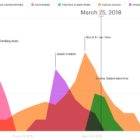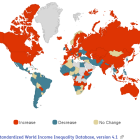Data Journalism
GIJN’s Data Journalism Top 10: Pirates vs. Princesses, Buenos Aires Crime, Awards & Fellowships
|
What’s the global data journalism community tweeting about this week? Our NodeXL #ddj mapping from January 7 to 13, 2019 finds @SZ’s analysis revealing how children’s books perpetuate gender stereotypes, @A24COM mapping the hottest crime spots and times in Buenos Aires, @dw_akademie offering a data journalism fellowship opportunity, and great chances to win awards from @WorldGovSummit and @GENinnovate’s Data Journalism Awards.








